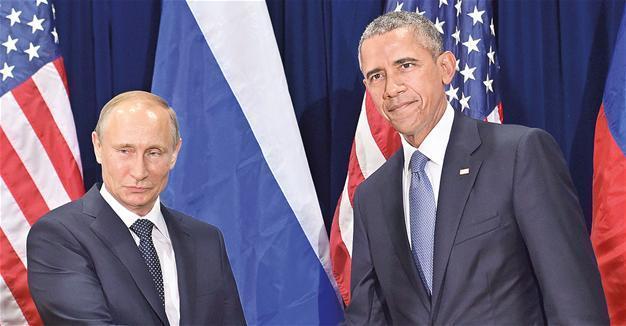US, Russia engage in diplomatic spat over alleged hacking
HONOLULU/ MOSCOW

The United States and Russia have engaged in a dangerous diplomatic spat, after the former issued sanctions on the latter over their involvement in hacking U.S. political groups in the 2016 presidential election, which sparked reaction from Russia.
U.S. President Barack Obama on Dec. 29 ordered the expulsion of 35 Russian suspected spies within 72 hours, imposed sanctions on two Russian intelligence agencies and a decision to shut down two Russian compounds in the U.S. on grounds that Russia was reportedly involved in hacking U.S. political groups in order to interfere in the 2016 presidential election.
“I have ordered a number of actions in response to the Russian government’s aggressive harassment of US officials and cyber operations aimed at the US election,” Obama said in a statement from Hawaii, where he is on vacation on Dec. 29.
“These actions follow repeated private and public warnings that we have issued to the Russian government, and are a necessary and appropriate response to efforts to harm U.S. interests in violation of established international norms of behavior,” Obama said.
“All Americans should be alarmed by Russia’s actions,” he said.
In response to the U.S. sanctions, as part of the “retaliatory” measures promised by the Kremlin right after the sanctions were announced, Russian Foreign Minister Sergei Lavrov suggested to expel 35 U.S. diplomats from the country.
Lavrov said in televised remarks on Dec. 30 that the Foreign Ministry and other agencies have suggested that Russian President Vladimir Putin order expulsion of 31 employees of the U.S. embassy in Moscow and 4 diplomats from the U.S. consulate in St. Petersburg. Another suggestion is to bar U.S. diplomats from using their summer retreat on the outskirts of Moscow and a warehouse in the south of Moscow.
Prime Minister Dmitry Medvedev has called the new round of U.S. sanctions against his country “anti-Russian death throes.”
“It is sad that the Obama administration that began its life by restoring ties ends it with anti-Russian death throes. RIP,” Medvedev, who during his 2008-2012 tenure focused on improving U.S.-Russia ties in what became known as the “reset” policy, said on Twitter.
Trump U.S. President-elect Donald Trump on Dec. 29 responded to the sanctions with a call for the country to “move on” and a conciliatory pledge to meet U.S. spy chiefs he has harshly criticized.
“It’s time for our country to move on to bigger and better things,” Trump said, echoing previous prickly reactions to allegations his November win over Democratic Hillary Clinton was somehow tainted by Russian interference.
“Nevertheless, in the interest of our country and its great people, I will meet with leaders of the intelligence community next week in order to be updated on the facts of this situation,” he added.
Obama put sanctions on two Russian intelligence agencies, the GRU and the FSB, four GRU officers and three companies that he said “provided material support to the GRU’s cyber operations.”
He said the U.S. State Department declared as “persona non grata” 35 Russian intelligence operatives and is closing two Russian compounds in New York and Maryland that were used by Russian personnel for “intelligence-related purposes.” The State Department originally said the 35 were diplomats.
The 45-acre complex in Maryland includes a Georgian-style brick mansion, swimming pool, tennis courts and cottages for embassy staff.
A senior U.S. official told Reuters the expulsions would come from the Russian embassy in Washington and consulate in San Francisco. The Russian embassy declined to comment.
The measures, taken during the last days of Obama’s presidency, mark a new post-Cold War low in U.S.-Russian ties and set up a potential flashpoint between incoming President-elect Donald Trump and fellow Republicans in Congress over how to deal with Moscow.
 The United States and Russia have engaged in a dangerous diplomatic spat, after the former issued sanctions on the latter over their involvement in hacking U.S. political groups in the 2016 presidential election, which sparked reaction from Russia.
The United States and Russia have engaged in a dangerous diplomatic spat, after the former issued sanctions on the latter over their involvement in hacking U.S. political groups in the 2016 presidential election, which sparked reaction from Russia.